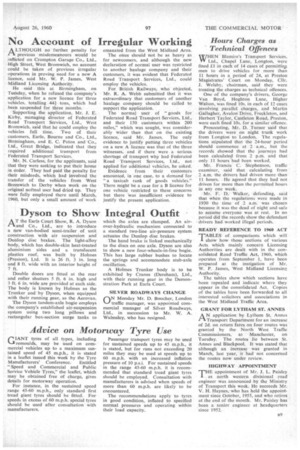No Account of Irregular Working
Page 43

If you've noticed an error in this article please click here to report it so we can fix it.
ALTHOUGH no further penalty for previous misdemeanours would be inflicted on Crompton Garage Co., Ltd., High Street, West Bromwich, no account could be taken of previous irregular operations in proving need for a new A licence, said Mr. W. P. James, West Midland Licensing Authority.
He said this at Birmingham, on Tuesday, when he refused the company's application for a new licence for three vehicles, totalling 44+ tons, which had been suspended for three months.
Supporting the application, Mr. J. E. Kirby, managing director of Federated Road Transport Services, Ltd., West Bromwich, said that he could employ the vehicles full time. Two of their customers, Earle, Bourne and Co., Ltd., Birmingham, and E. C. " Paton and Co., Ltd., Great Bridge, indicated that they required additional transport from Federated Transport Services.
Mr. N. Carless, for the applicants, said that they were seeking to put their house in order. They had paid the penalty for their misdeeds, which had involved the transfer of the vehicles from West Bromwich to Derby when work on the original notrnal user had dried up. They were fully employed there until March, 1960, but only a small amount of work emanated from the West Midland Area.
The onus should not be as heavy as for newcomers, and although the new declaration of normal user was restricted to another haulage company and their customers, it was evident that Federated Road Transport Services, Ltd., could employ the vehicles.
For British Railways, who objected, Mr. R. A. Webb submitted that it was extraordinary that customers of another haulage company should be called to support the application.
The normal user of " goods for Federated Road Transport Services, Ltd., and their 150 customers within 200 miles," which was sought, was considerably wider than that on the existing licence, said Mr. James. The only evidence to justify putting three vehicles on a new A licence was that of the three witnesses, and if there were a serious shortage of transport why had Federated Road Transport Services, Ltd., not applied for additional vehicles, he asked.
Evidence from their customers amounted, in one case, to a demand for "a taxicab rank of goods vehicles." There might be a case for a B licence for one vehicle restricted to these concerns but there Was insufficient evidence to justify the present application.




















































































































